Luke 6:20-31 CEB There are times I don't feel my job is easy. Not because I can't get enough words out for the weekly meditation, because that's just word count. Honestly, it becomes easier to write the longer I do it. It is difficult when my call breathes shoulder and down my neck to tell me to do what I am here to do. I believe I am called to speak from an authentic educated voice in order to stitch the broken pieces of Christianity back together. The longer I do it the more I see how difficult my call actually is. The first part is not difficult. Any person can put out a soapbox and say whatever they want. The internet is full of people with big ideas both good and bad. As I said before, the voices on the internet are so many, it becomes difficult to hear authentic. So, the problem comes when I am standing with a thread and needle, a bottle of glue, or whatever metaphor you want to imagine to help you see what I am saying. It is terribly easy to pick the poison over the antidote, because the poison is packaged up in a nice and easy to swallow dose. The truth is gathering dust in the corner because the truth can get the good ministers fired and the real messages ignored. In a world where everyone is promising the easy solution, the real solution is pushed aside. I have prefaced in the way I have because the scripture today was where it all began for me. It all hit me while sitting in a class my very last semester in seminary. Before this class my war cry (if you can call it that) was God is love, loving is acting out God, and it is that easy. I consider this the base for my theology. If you are not reading this base in my meditations I suggest you return to them, because it is there. By my last semester I was really waking up. My first year I was pregnant, the second year I was a new mom. I learned much these first two years but I have to say it was more allowing the information to sink in because I was just too tired to engage the material. My third year the Word was alive and I was alive. My prayer to God was simple: I have a base, what do I do with it? In this last class of my seminary career, the professor placed the Sermon on the Mount in front of us, both scriptures from Matthew and Luke. They are both extremely similar, but both quite different. Matthew’s gospel has Jesus saying “Blessed are those who thirst and hunger for righteousness sake for they will be filled.” In contrast, Luke’s gospel has Jesus saying “Blessed are you who are hungry now for you will be filled.” If they sound the same to you, they are not. Matthew’s take has Jesus searching for the soul of the issue; the internal struggle. Luke’s take has Jesus searching the physical issues of real hunger and poverty. One is external and one is internal. Someone in the class asked, "Which one do we follow?" I heard the professor say, "It really is a personal choice. Pick the one you like and follow it." 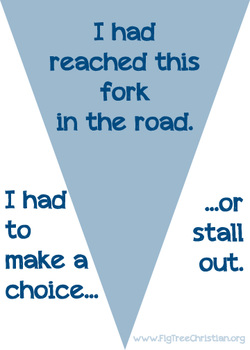 I knew the moment I heard those words come from my professor my answer would shape my future within Christianity. I had reached this fork in the road. I had to make a choice or stall out. I found myself asking some very important questions on my road to discovery. Which came first? Matthew or Luke? I found that answer wasn't sufficient enough so I asked, which one is the more accurate depiction of Jesus Christ? I found, either way you go there are countless scholars on both sides of the argument. It didn't seem there was a consensus! So, I really couldn't turn to the scholarly opinion on this one… My final decision was to choose a new road focused on the base of my theology: God's love. They are both the words of Jesus. Matthew was said to the crowd and Luke was said to the Disciples. It makes perfect sense! God cares about both the internal and external struggle of humanity! They both lead to very different and important conclusions: Jesus’ words in Matthew leads to how people see you even if the blessings and needs are internal. Jesus’ words in Luke lead to how you should treat others, even if it sounds like it is condemning a specific group of people. (And, in all honesty, as a social gospel, it does a great job condemning all equally.)  So, let’s heighten our focus specifically on Luke as a “Social Gospel.” If Jesus’ words had finished at verse 26, after condemning those ‘who have’ verses those ‘who have not’ it would draw a line in the sand separating those God loves with those God does not. Stopping there, the answer is clear- God is for the oppressed. God’s focus is solely on those who are in need. If you are in a good place right now physically you should be wary- divine reversal is headed your way, and it’s not pretty. The only salvation for those ‘who have’ is to understand how we have oppressed others and come to God in utter humility of our actions. How’s that for a Halloween scary story? I have two problems with understanding the scripture that way. First, it draws the line in the sand. Was it not Paul who wrote “In Christ there is no slave or free, male or female?” It seems a little off to me. Secondly, the ‘have nots’ are off the hook when it comes to relationship. Isn’t that interesting? It does this by maintaining a group of people in a specific way. It would make a group who are poor and oppressed feel guilty if ever they were to achieve anything, if ever they were to rise above their oppression. If they were ever to become one of the ‘haves’ they would be in danger of facing divine reversal. (In this case, another phrase for God’s wrath.) And now you all know the major critique of Liberation Theology. I am not the only one who sees this issue. But thank God! Jesus continues speaking. If Jesus draws lines in the sand it is only to show what we have done to ourselves and Jesus always follows it up by erasing those lines. The next line in verse 27 is: “Love your enemies- do good to those who hate you. Bless those who curse you, pray for those who abuse you.” Jesus is talking about loving a group of people who live in an attitude of hate and act out by drawing lines in the sand, creating separations. Finally, scorning the ‘less than worthy’ from their safe distance. If anything, the more difficult task remains for those who are considered the ‘have nots.’ The turn thy cheek approach sounds easy on paper but when you are verbally or physically slapped the reality of it could become as difficult as overcoming a brick wall. It just seems impossible. And, what makes it so difficult is love. 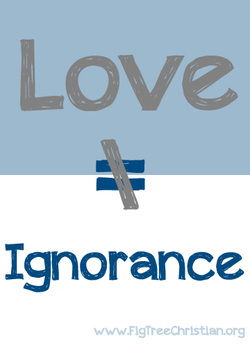 Love is not ignorance. If you are acting in self interest it might mean leaving or reacting in hate back. If you are acting in love you are seeking the best possible outcome for the situation. If you love those who persecute and scorn you, you are seeking to make them the best they can be. You want them to overcome what they have become. More importantly, it seeks to end the cycle of hate. See how difficult that is? Have you ever felt arguments devolve into playground battles? It is so petty you just expect a teacher to come up and ask why you hit that girl. I can just hear the answer in my mind: “She hit me first.” The truth is our lives are more complex than school yard bullies. Also, we are no longer children. ‘When I was a child I spoke like a child, I thought like a child, I reasoned like a child; when I became an adult, I put an end to childish ways.’ Uh, in some ways, we haven’t. I have heard it throughout the years. In fact, one of these I heard this past week. “She will get hers in the end.” “I have one word for him, Karma.” “I hope they suffer as much as I have.” When I was saying the ‘have nots’ have the more difficult job, I wasn’t kidding. Pain is not fair. There is no equality when it comes to hurting others. There is only the false sense of power from those creating the pain and the brokenness of those experiencing it. And in the end, the ones inflicting pain are also hurting themselves. The only equality comes from love. And that is true whether you are dealing with the internal or the external struggle. It is true whether you are reading the Gospel of Matthew or the Gospel of Luke. If I could sum up what Jesus was saying to the Disciples: end the cycle of hate. Do not hate those who hate you. They are truly hurting themselves. They too are a member of the body of Christ and God wants them to find wholeness as well. I shared a message very similar to this three years ago. They did not take it well because they couldn't see why I would point out the differences in a moment that was supposed to be the same. I had my soapbox and they turned me off instead of listening to what I was really saying. There is something I want to share with you that I didn't share with them, and I wish I did. The Sermon on the Mount highlighted for me how broken Christianity has become. We are two groups each speaking our own language. We are like the Mystics and the Skeksis from the Dark Crystal. One side is all spiritual and individually focused. One side is physical and communally focused. In our drive to pick which Sermon on the Mount we align ourselves with we fail to see Christianity is broken. Our only hope is praying there is a Jen out there who has the piece that will bring us back together and give order to our chaos. To help us see both sides are right. Until then, I have built my soapbox big enough to hold others too. Let's blaze this third trail together and begin bringing people back together. If for nothing else than for the sake of God's love to God's people. Like what you are reading? Join the conversation on Reddit! http://www.reddit.com/r/FigTreeChristian/ . There you can also share blogs and articles that extend the discussion, or just add to the discussion on this meditation. Either way, look forward to seeing you there!
Also- check back on Tuesday as we celebrate our one year anniversary of our online launch! Luke 18:9-14 CEB When I was younger I prayed almost like I was a pill bug. I would roll myself up and hold my hands together tightly. Back when I was younger there was much I didn't know about myself because it was wrapped up and concealed from my recollection. I didn't know my prayer methods were unhealthy personally for me. Mostly, the position I chose to use was not for the sake of humility. I was acting out of comfort. I was uncomfortable with who I was and rather than present myself before God in a way that exposed my true being, I hid within my ball of protection. I felt I was being humble when really I lacked self confidence. We mustn’t confuse lacking self confidence with humility. For those who lack confidence, believing their lives are lived in humility could maintain issues God wants them to overcome. Humility before God is not making yourself into something you are not, but being aware of who you are and coming to prayer in open anticipation of whatever God brings. When I finally realized how I was protecting myself rather than communicating with God I opened myself up, outstretched my arms, and found humility for the first time in prayer. 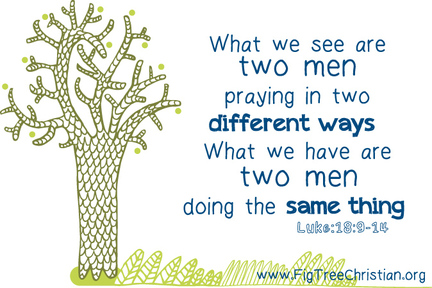 I began with myself because it appears to be a contradiction to today’s scripture. To stand with your arms opened wide can be an arrogant position. I know, as a child, when I heard this scripture I always imagined the Pharisee to be praying with gold dangling and arms outstretched. After a lifetime of sermons, many of which were focused on Pharisees, I did not want to be one of those, and I still don't. There are two characters in our parable today: a Pharisee and a tax collector. Jesus is a sneaky man. He doesn't pick his characters for his parables haphazardly. He doesn't pick the situations haphazardly either. In this one Jesus pulls off a magic trick. What we see, are two men praying in two different manners. What we get, are two men doing the exact same thing. Let me expand: first the tax collector. The man, standing far off, would not even look up to heaven, but was beating his breast and saying, ‘God be merciful to me a sinner.’ Now, beating your breast was not some act of self chastisement. He wasn't enacting corporal punishment on himself. In the ancient near east beating your breast was a sign of mourning. We can find it in another place in the bible too: When Jesus dies in chapter 23 of Luke, the people watching beat their breasts. They were mourning their fallen Lord. The tax collector does a symbolic act in order to show he was sorry for his prior actions. Now the Pharisee. This man was standing by himself and admits to fasting twice a week. Now a little bit about fasting. It was understood there was only one fast required by Jewish law: the Day of Atonement. Now, there were other reasons to fast, the most common and frequent being, you are mourning someone or something. It had become tradition for Pharisees to fast twice a week. It was not just this Pharisee but all Pharisees. So, the Pharisee does a symbolic act in order to show… in order to… (this is where you hear crickets.) 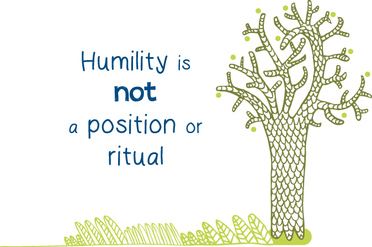 Both men were doing the same thing. They were both engaging in a symbolic action which typically showed they were mourning. Now this is where Jesus’ magic trick comes back in on itself again. Even though the two men were doing, pretty much, the same thing, they are also doing something completely different. The Pharisee was focused on ritual and those around him. He believed his righteousness was in following those empty rituals and comparing himself to those he "knew" are less than worthy. He was not praying to God, he was worshiping himself. He had, in essence, made himself the false idol. The tax collector was focused on truth and God. He did not come into prayer with empty rites and strayed focus. He was truly mourning who he had been and was coming to God for repentance. They may have been physically doing the same thing but they were mentally and spiritually in two different worlds. Humility is not in a position or a ritual. Postures and rites are only tools to achieve what you already have in your heart. Humility is honestly coming as you are. Anyway, reality is not in what we see. Reality is what we mean. Don't believe me? Look at the Pharisee. What we saw was an act of mourning. He was fasting, outside of typical times of fasting. Therefore, he was engaging in an act of mourning. However, what he meant was self-adulation. He wanting to be praised to for doing something that ultimately meant nothing. Which one was reality? Yes, we can say he physically fasted twice a week but was that really who he was? ‘All the worlds a stage and all the men and women merely players.’ (W. Shakespeare, As you like it) The reality, in any situation, is what happens behind the curtain, not in front of it. The reality is written on our hearts not on our hands. What it comes down to is honesty. When we can honestly read our hearts and come to God as we are, we have no choice but to be humble. None of us are perfect. We all need to grow in different ways. So yes, how we achieve humility and honesty will be different for everyone. Some might need to come as the tax collector, mourning past failures and asking for help and repentance. Some might need to come open to accept what God has given them. Yes, it is a humble experience to accept God’s blessings. Humility can happen by yourself in a sacred spot, or in a room full of people where you are the center of attention. (Albeit the latter is more difficult to accomplish.) Anyway you accomplish true humility it comes with reward. Because the tax collector came in honesty, as he was, he left with something extra- redemption. When I was able to find humility in opening myself up I found confidence. God wants each of us to be the best we can be. Honesty allows us to admit where we fail and allows God to step in and and help us grow. Let me leave you with this thought: We are all really Adam and Eve before God. We all have our own fig leaf hiding our secrets. We can either choose to remain hidden knowing nothing is hidden from God, or we can accept our humility (our brokenness, or fear) and come to prayer just as we are. As God created us to be. Like what you are reading? Join the conversation on Reddit! http://www.reddit.com/r/FigTreeChristian/ . There you can also share blogs and articles that extend the discussion, or just add to the discussion on this meditation. Either way, look forward to seeing you there!
Jeremiah 31:27-34 CEB I love those old sayings. You know, the ones used at a drop of a hat to make a complex point in just a sentence: One man's junk is another man's treasure. A friend in need is a friend indeed. A penny saved is a penny earned. Give a man a fish and he'll eat for a day; teach a man to fish and he'll eat forever. We have something in common with the israelites, they had their own sayings too! Most of them were collected and put into a book we know today as the book of Proverbs. Yet even with this book some of those saying didn't make the final cut, even though they still found a way to make it into the bible . One of those cutting room floor quotes can be found in verse 29 of our text today. The parents have eaten sour grapes and their children's teeth have been set on edge. It makes my mouth uncomfortable every time I read it. It makes me think of when you get a baked potato wrapped in aluminium foil but you fail to remove all the foil before taking a bite... it's that terrible feeling of the metal touching fillings. I digress. Just like our sayings today the Israelite Proverb says something complex in an easier way. Let’s backtrack, a lot! The Israelites have been freed from Egyptian bondage. They have recently arrived to their new home, the wilderness, when Moses makes a trip up to the mountain to work with God on a few rules or commandments. For those of you who remember the story, before Moses even returns with the new commands the people had already broken one of them, specifically: You shall not make for yourself an idol, whether in the form of anything that is in heaven above or that is on the earth beneath, or that is in the water under the earth. You shall not bow down to them and worship them. Because Moses had spent so much time on that darn mountain, they people began to feel God was no longer with them so they crafted a calf from their gold and began to worship it. Not a good start especially with that particular commandment. See, it continues: For I the Lord your God am a jealous God, punishing children for the iniquity of parents, to the third and the fourth generation of those who reject me. Ouch. It is a strong claim and one that is mirrored in the book of Numbers: The Lord, is slow to anger, and abounding in steadfast love, forgiving iniquity and transgression, but by no means clearing the guilty, visiting the iniquity of the parents upon the children to the third and fourth generation.’ So the Israelite phrase: The parents have eaten sour grapes means the people have sinned/transgressed/whatever foul phrase you would like to add here. The children’s teeth are set on edge means the future generations are being punished for the sins of their ancestors. A nice way to say everything that has already been said: be wary what you do today or it might play negatively on your family’s future. So now that we have backtracked, let’s go forward to today’s scripture. The Israelites in Jeremiah are not the Israelites who first received the commandments. These are the fourth and fifth and so on generation of those Israelites. The proverb, which was written as a warning, was not directly meant for this group of people. It was written as a reminder of God’s commandment and to keep focus for the sake of the children and the children’s children. For the Israelites of Jeremiah they were not even concerned about the first part of the proverb. They were the children to the third and fourth generation. One of the reasons they did not want to listen to Jeremiah was this proverb. In their minds there was nothing they could do to stop God’s “wrath” for they were suffering from their parent’s indiscretions. You know, the story of the God and the people is a beautiful tale even if the Israelites didn't see it that way. Here are a people who were almost hopeless. They were going to lose everything. Time and time again God gave them chances but they kept fouling up. But that is just the surface. The Israelites cast a graven image and worship it- God has Moses recast the commandments and start over. The people act out in the wilderness- God moves from the mountain to reside with the people in a tent. Once in the promised land the people start worship false gods again. God sends prophet after prophet to the people. Yes, by chapter 31 in Jeremiah the last nail has already been nailed in the coffin, the Babylonians are going to conquer Israel and exile her people. However, in my opinion, this is the most beautiful section of Jeremiah. The Israelites thought Jeremiah had been yelling out judgment when really he was singing salvation. No, they could not stop what was coming but God could recast it. A new covenant was written- not in stone in some building in the middle of Jerusalem but on each individual heart. This chapter in Jeremiah marks the time when God not only resided with the people but in the people. God was no longer just a God for a group but also for the person. Before, God would only reside in the temple to be visited by the priests who would act on behalf of all of Israel. In this one chapter, God tears down the walls and we become the temple. We can know God because God is within us. Jeremiah was a glorious bitter-sweet mess with more bitter than sweet. Here is your sweet. Perhaps the book of Jeremiah is not a particularly redemptive story for the people of Israel but it is for God. This chapter marks a turning point. God lives within us, each of us. When we cannot live in the house of God the house of God lives in us. This message kinda hits me in a bittersweet way. I love the church. I live for the rites and rituals that happen every Sunday morning. Back before I moved to Georgia the first time I asked the minister if I could spend an hour alone in the church praying. When I moved back to Georgia the second time I was most distraught I didn't have the church to go to. This was amplified when I returned to Georgia and found myself saying goodbye to the particular church I attended in school. I felt so disconnected. The people need a place to connect. The people need a way to communicate and know there are others they can talk to. It is also nice to know in exile God is still there. Our heart becomes God's temple, and the actions that affect that temple the most are my own. I pray that I keep my temple as clean and as pure as possible so it can be a proper place for the divine to live. If not, I pray God can help me tidy it up a bit. Either way, I am grateful God is there with me. Like what you are reading? Join the conversation on Reddit! http://www.reddit.com/r/FigTreeChristian/ . There you can also share blogs and articles that extend the discussion, or just add to the discussion on this meditation. Either way, look forward to seeing you there!
Luke 17:11-19 CEB On the 15th of May in the Jungle of Nool, in the heat of the day, in the cool of the pool. He was splashing, enjoying the jungles great joys when Horton the Elephant heard a small noise. The Whos, he heard the Whos. A tiny group of people who lived, of all the precarious places to reside, a dust speck. Not just any dust speck, but a dust speck at the mercy of the wind. As the parents of two young children Linc and I have both read our share of Dr. Seuss. Out of their earshot we have both joked about how the Whos are just asking for it. First, they are at the mercy of the elements as the wind can drop them into a pool or quick sand or a hot steaming kettle of beezlenut oil. Also, they go to war over the silliest things, like whether you like to eat your bread butter side up or butter side down. Finally, they have little regard for their resources. They refused to replant new truffula trees when they cut down their old ones and therefore destroyed their forest. A great question for another day is, IF Horton had known they were inches away from self-annihilation would he have still chosen to save them? 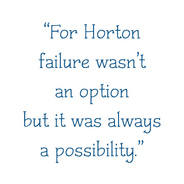 The truth is, Horton had compassion for his dust speck not because they deserved redemption or could give something back to Horton. We can mull over the moral prospects of his choice but it is a non-issue in this case. Horton saw a group of people who needed help and he was going to help them. After all, a person's a person no matter how small. This wasn't an easy choice for Horton. The decision to protect these Whos came at a price. He was ridiculed by his community, he was displaced from his home, and he worked his body to exhaustion while chasing a bird who stole his new friends and carried them across the land. He searched through three million clovers to find them once they were dropped by the bird. Dedication at a price. For Horton, failure was not an option but it was always a possibility. 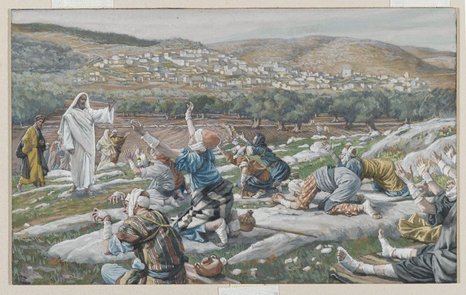 On the dirt road way, to Jerusalem's home, in the heat of the day, on the path where they roam. He was conversing- with disciples their loves and their joys, when Jesus of Nazareth heard a loud noise. The lepers. He heard 10 lepers to be exact. Off in the distance they cried out to him for help. They lived, forcefully, in the margins. They were unclean and as such had to be separated from those who were considered clean, even if those people were friends and family. It would not have been an uncommon thought to believe God cursed them. 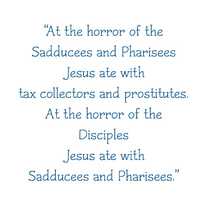 That is how some people unfortunately answered the question: why do bad things happen to good people. They thought, well, because it happened to them that must mean we only thought they were good. If we knew them like God knew them we would learn just how terrible they really were. It was that “they had it coming” argument that left the poor and sick on the margins away from the others. It would have given Jesus a so called reason to ignore the ten people. (At least socially.) No one would have stopped him on the road later to ask, “Why did you ignore them?” It would have been unfortunately understood. See, our story could have ended before it begun but Jesus never did anything for social reasons. At the horror of the Sadducees and Pharisees, he ate with tax collectors and prostitutes. At the horror of his disciples and other followers he ate with Sadducees and Pharisees. He wasn't doing anything for the praise and adoration of anyone! He was simply doing what was right. So instead of continuing on the path, he stops and tells the ten, “Go show yourselves to the Priest.” This wasn't because the priest had some magic elixir or secret incantation to say to the ten. No, the priest was the one who said whether you had leprosy or not. Wait! Ten lepers who know they were lepers were asking Jesus for help and Jesus basically responds- Go see if you are really lepers. What?! Of course they are lepers! That is why they are asking for help! But it wasn’t in seeing the priest the miracle occurred, for on the way to the temple they discovered they were cured! Their trust in Jesus as the son of God, their faith, healed them. 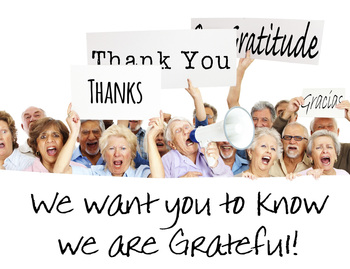 You might be wondering right about now, why did I bring up Horton and the Whos in relationship to this text. My head would be spinning right now if I didn't know where I was going with this, but I do. In one of our evening conversations, Linc brought up an excellent point in relation to Horton. At the end of the book the Whos are saved! Finally, the Sour Kangaroo and the Wickersham Brothers hear the Whos. If it wasn't for Horton an entire people would have met their end. The story ends and everyone lives happily ever after. Only, in the book you never hear a thank you. Their lives were saved and out of possibly tens of thousands of Whos not a single Who says thank you. Interesting, huh? Linc asked me, if Horton knew he wasn't going to get a thank you, would he have still saved the speck? Now that is the question I feel needs to be answered today! Let’s compare: with or without gratitude both the Whos and the ten lepers were saved. It was not their gratitude that saved them. For the Whos it was their faith in Horton- an elephant who had complete control over their fate and destiny. The Whos could do nothing to save themselves from the power of the wind. Only Horton could save them. For the ten lepers it was their faith in Jesus- both human and God. The lepers could do nothing to save themselves from their leprosy. Only God could save them. To answer Linc’s question let’s ask the same thing of Jesus: Would Jesus still have saved the nine ungrateful lepers if he was aware they would not say thank you? I believe the answer to both Jesus and Horton is a resounding yes! Neither Jesus or Horton acted for the sake of gratitude and praise. Both were concerned with what was right, and what was ultimately right was helping a group of people who were unable to help themselves. In relation to Jesus, he had compassion for the ten not because they deserved redemption or could give something back to Jesus. We can mull over the moral prospects of his choice but it is a non-issue in this case. Jesus saw a group of people who needed help and he was going to help them. After all, a person's a person no matter how small. So the first lesson is this: do good, but for the sake of doing good. Do not do it for praise or adoration.  That leads us to the end of our story. Horton is not real. He is a character created to bring a moral point forward. Jesus is real, and as a real person he had real reactions to the other nine. I dare say he was frustrated over their lack of appreciation. (Not over praising Jesus, btw, but over not praising God.) Now if Jesus is frustrated, shouldn’t that say something for how we should return gratitude to not only God but to everyone? Maybe we shouldn’t do something to seek praise but we should be ample with our ability to give it. Just think about it this way: if Jesus, the son of God, gets frustrated, just imagine how frustrated your friends and colleges get when they are not thanked for their hard work. So- the next time you read Horton hears a Who praise Horton as he selflessly and thanklessly will do anything to save the Whos. And, lament the Whos. They would go to war over buttered bread, destroy their local wildlife, and can’t even say thank you when their world is saved. Horton still loves them. For that matter, God still loves us. And for that I say- thank you! Like what you are reading? Join the conversation on Reddit! http://www.reddit.com/r/FigTreeChristian/ . There you can also share blogs and articles that extend the discussion, or just add to the discussion on this meditation. Either way, look forward to seeing you there!
Psalm 137 CEB Below is the transcript of the sermon. If you prefer reading, please at least listen to the scripture.  my old house my old house This week means a few things to me. * It is world Communion Sunday. I love communion. Personally, it is the symbol in in the Christian faith I connect to the most. * It also broke my ankle three years ago, almost to the day. I can remember the congregation I worked for had this step to get up to the pulpit. I would have to jump the step every Sunday with my crutches. * Finally, my sister has been doing some digging and it has dug up the old feelings I had buried. Our recent conversations and our Psalm tie together. See, for about a year to a year and a half, we lived in a very broken home. My Dad and Mom divorced. My mom won custody but she was an unfit mother. It is sad to say that. She wants to believe she was super-mom. She was most definitely not. She married an abusive drunk and spent the child support on alcohol and a vintage truck. So much happened in that brief time. I can encapsulate it in one sentence. As children, we lost weight during that time, and I have struggled to socially connect ever since. My sister and I have chosen two different ways to deal with that time. I have begun to bury. My sister, she dug up. That is what she did this past weekend. She dug everything up. She asked questions, she visited gravestones and previous places we used to live. She sat with Dad's attorney from years ago and looked through the court records. The only thing she hasn't done is engage my mom. She is the 'least of these' we read so much about. As ministers, my sister and I, we struggle because we know this. We struggle because we are dealing with a situation where we were damaged by our mom and we know mom needs our love. Believe me, there are times I hear this Psalm and I think about my exile in a small bedroom in Missouri with the only release was school. Today I am struggling. I am struggling personally, and with a culture that doesn't know what to do with us, any of us.  We live in a culture where we don't like broken. We don't know how to deal with it. It is much easier to relate with the new, and healthy. Advertising is one of the biggest culprits. Through commercials happiness is found by throwing away the old and discarding the broken. This is counter to our nature, because if you were to go shopping today for anything from shoes to furniture, it wouldn't be difficult to find products that have been aged or distressed. We want well worn seasoned products. We just don't know what to do with those products when they break. Sadly, the same is often true of people. Society does not know how to deal with broken people. No, I'm not talking about cuts, bruises, and broken bones. I'm talking about broken souls. Souls cannot be fixed with ointment, casts, and titanium pins. Oh, we love fixed people who were once broken. Everyone loves a good story about the homeless man who became the millionaire or the drug addict who turned his life around to become a famous preacher. A prodigal son of sorts. (I mention these two examples because they are real. I just sited The Pursuit of Happyness and the son of Billy Graham, Franklin Graham.) Still, we don't like the messiness of a broken person. Broken people are often shunned by society. As a defense, of sorts, broken people cover or hide their brokenness. This doesn't solve their woundedness and could make the situation worse. We are a culture who likes to hide things. We hide our trash and bury our secrets. When I think of hiding things I think of Disney World. They have a whole system of underground tunnels just so they don't have to show people emptying the trash or delivering goods. The park looks perfect because everything messy is done underground. So this is what can be so distressing about Psalm 137. The pain, the wounded and brokenness is not hidden. It is right there for all to read. This is not a happy Psalm. Not here. 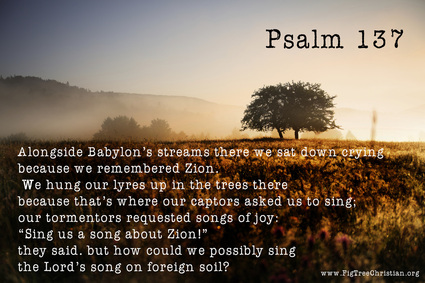 Historically speaking the Babylonians conquered Israel and took the elite and well to do back to Babylon. This was standard Babylonian practice. Leave a people in their land and they might rise up. Take them out and they stay oppressed. The voices of this particular Psalm were probably the Levites. They were known for being the temple musicians. It was probably written after the exile was over and the Levites had the opportunity to reflect and write songs about their experience. They were not expressing empty anger. According to the Psalm, the Babylonians had asked them to sing a song of Zion. Songs of Zion were specifically meant to be sung in Zion. Whether the Babylonians knew it or not they were pouring salt into the Israelite wound. In particular, there are some Psalms of Zion that would have deeply hurt: Psalm 48 for example. “The city of our God: God makes her secure forever.” Well, at the point in Psalm 137 they knew God's temple was not going to last forever because it was already destroyed. It would have hurt to sing such a song to the very people responsible for tearing it down. The Babylonian request to sing a song would have come across as a taunt. Still, it is difficult to hear that last: “Happy shall they be who take your little ones and dash them against the rock.” If we ended right now we would all be in a bad place. This is a Psalm about a bad part of the Israelite history ended in a rather terrible way. What can we do with this? I suggest we turn to Luke 12:3. “Therefore whatever you have said in the dark shall be heard in the light, and what you have whispered in private rooms shall be proclaimed on the housetops.” As I was reminded earlier this week, this verse can be very uncomfortable. We tend to be a bit more honest in private. We say things we might not want the world to know. Luke 12:3 suggests nothing, even our dirty laundry will be hidden. I will admit, I'm a little intimidated by that. But, there is a good side to this verse I am sure few think about and it relates directly to Psalm 137. The voices of the broken and sick are often muted or are not loud enough for society to hear. Sometimes those you have been spiritually wounded or are spiritually sick choose to remain silent for fear of the stigma attached admitting they might not be well or whole. Luke 12:3 becomes something beautiful and glorious for these people. People who are afraid to speak out loud and whisper: I am hurt. I am in pain. I am angry. God wants, no, needs those voices to be brought out of the darkness and into the light. Not so they can be reprimanded, but helped. See, acting on vengeance in the world is clearly wrong, but that is not what this Psalm is about. This Psalm is about being the ears to someone's voice. God loves us in our pain too. God wants us to find wholeness so we can celebrate making it through the darkness into the light. Psalm 137 reminds us we need to be open to hearing the pain and woundedness of others. It is that simple. Sometimes just listening can help someone on the road to wholeness.  Today is World Communion Sunday. Congregations all over the world are celebrating communion today whether they are like us, and partake every week, or have communion every quarter or only on special holidays. Communion is the symbol for today's scripture. Jesus gave us the perfect symbol. The communion table is broken and made whole again. Jesus took brokenness and redeemed it. He took a bunch of broken people around a table and made it OK to be broken. (Acceptance of our brokenness is part of the healing process.) Jesus took on brokenness to the extreme and came through on the other side. But brokenness had to exist for the the healing to exist. Today we celebrate our brokenness instead of throwing it away. Today we allow ourselves to be open instead of buried. We do this because God taught us love, and sometimes love is just an open ear. Like what you are reading? Join the conversation on Reddit! http://www.reddit.com/r/FigTreeChristian/ . There you can also share blogs and articles that extend the discussion, or just add to the discussion on this meditation. Either way, look forward to seeing you there!
One Chaplain’s Response to the Recent Chaplain Profession’s Portrayal in Grey’s Anatomy Kimberly Russell is a full-time staff chaplain at St. Jude's Children's Research Hospital. As a disclaimer, she is also Pastor Melissa's sister. Kimberly is a fan of Grey's Anatomy, but recently has been frustrated at the ignorance the writers have shown to the very important role chaplaincy plays in the hospital. Below she shares her frustration with the popular ABC show. I have been a devoted fan of Grey's Anatomy since Season One. Sadly, the most recent episode, I Want You With Me, offended me. I am a professional chaplain in the clinical setting (a pediatric hospital to be specific). I have played the game "And That’s Why They Need a Chaplain" pretty much every episode. I am not offended the writers have not written in chaplains. I understand why they would avoid such characters. With chaplains, the level of drama would subside...surgeons would not have the depth of conversation with patients and families; they would not be the ones to locate religious leaders or provide extensive bereavement support. Issues like the denial of blood products would have a clear voice from a staff person understanding patient's religious rights. I get how chaplains would lessen the drama the main actors would be able to experience. I am offended because the episodes Seal Our Fate and I Want You With Me both reference chaplains, yet no chaplain ever makes an on air presence. When firefighter Lenny died, in Seal Our Fate, a firefighter shares with his colleagues that their chaplain was in route to inform the spouse and children of the loss. This is totally appropriate. It did, however, make me uneasy that the chaplain did not come with the wife or provide support for the squad injured and distraught at the hospital. That is not unheard of but it is uncommon for a chaplain not to be where the bulk of his/her people are. Once again, I see how a chaplain's presence would lessen the drama of firefighters not following medical orders.  What actually offended me is Grey’s Anatomy highlighting the lack of chaplains for the hospital during the episode I Want You With Me. The engaged couple (firefighter and cop) specifically asked for a chaplain because they wanted to get married urgently due to the female's poor prognosis and possible upcoming death. People with chaplain experience (military, public servants, some private schools and organizations, familiar connection) are more likely to ask directly for a chaplain because they are familiar with chaplains. The blank looks on Avery and April's faces are priceless because obviously they are not familiar with calling on chaplains. Avery attempts to locate a chaplain and, wouldn't you know, not a single chaplain was present in the hospital during an obvious hospital emergency. Each hospital is different, some would have the chaplain on call, others might have the director of chaplain services, yet others would function with volunteers...but the fact that all chaplains were in the field "tending to storm victims" is absurd. Chaplains would most definitely be on the call list during a mass casualty or critical event for the hospital. Another moment of frustration happened when Avery was on the phone with a hospital employee and asked for a chaplain, Hasan, by name. Obviously he was familiar enough with chaplains to know one by name but unfamiliar with the process to contact one during an emergency. Looking for a chaplain to come to the hospital he asked for "any religion." He was then offended when the person on the other line asked "even a Catholic?" This is not an inappropriate question. Chaplains are ordained clergy through their specific faith tradition and some have specific 'dos' and 'don'ts’ in regard to sacraments and rituals. There are some Catholic chaplains who are not able to marry a couple due to any number of reasons. The exchange in the clip demonstrated how difficult it can be for chaplains to locate the appropriate resource in a time of emergency. We don't keep one of every religious leader stashed in a closet 'just in case'. Religious organizations come with their own political system and it can be challenging to navigate at times. Nevertheless, this shouldn't have been a problem because a chaplain should have been first responder to the hospital, not to the scene of an outside accident.  If that wasn’t enough of a dig at my profession, the following sequence occurred. I was shocked with how nonchalant April was when she mentioned that she could 'go online and get certified by that place on the internet' if it weren’t for her current relational issues. She has spent several episodes struggling with her faith and the importance of Jesus and God. She valued her spiritual relationship. Of all the characters to suggest a quick online certification, which takes the Church out of the equation, April would be my last choice. So Avery goes online and 'gets ordained' and performs a wedding with Bible in hand... part of me wishes the journey to become a chaplain was that easy. Chaplains go through several years of schooling. For Protestant Christian Chaplains (noting this one because it is the path I took), one needs a 4-year Bachelor's Degree, then a 3-4-year Master's Degree in Divinity (or equivalent) depending on the institution and student. My degree was 81 hours. A full graduate load, and only attending in the Spring and Fall would take 4 1/2 years to complete. The education and training does not stop there. After completion of a graduate degree, a chaplain needs to take a year residency. Many institutions require an internship before this residency, which may be taken during the Master's Degree program. Only after all the aforementioned training is complete will institutions hire the individual as a professional chaplain, but the chaplain still needs to complete 2000 hours of professional service before he/she is able to sit for board certification (one can sit prior to 2000 hours for provisional status). Chaplain's maintain annual competencies through 50 hours of continuing education and have peer reviews every 5 years. To relate it to your characters, how would they feel if someone with no training came waltzing in claiming to be a doctor and not only were they allowed to continue practicing but were praised for their ingenuity in a time of crisis? Due to the inability of this show to recognize my profession as legitimate, I plead that Grey's Anatomy never mention chaplains again. That way people can play the game, "And That's Why They Need a Chaplain" or just be ignorant to the fact that Seattle Grace/Mercy/Grey/Sloan Hospital has a horrible system in place for psychosocial needs of patients, families and staff. This has been edited and approved by Chaplain Kimberly Russell for publication. If you are in the Atlanta area consider coming to the planning this Sunday, October 6th . For more information check out Upcoming Events!
Like what you are reading? Join the conversation on Reddit! http://www.reddit.com/r/FigTreeChristian/ . There you can also share blogs and articles that extend the discussion, or just add to the discussion on this meditation. Either way, look forward to seeing you there! |
Categories
All
Archives
October 2023
|


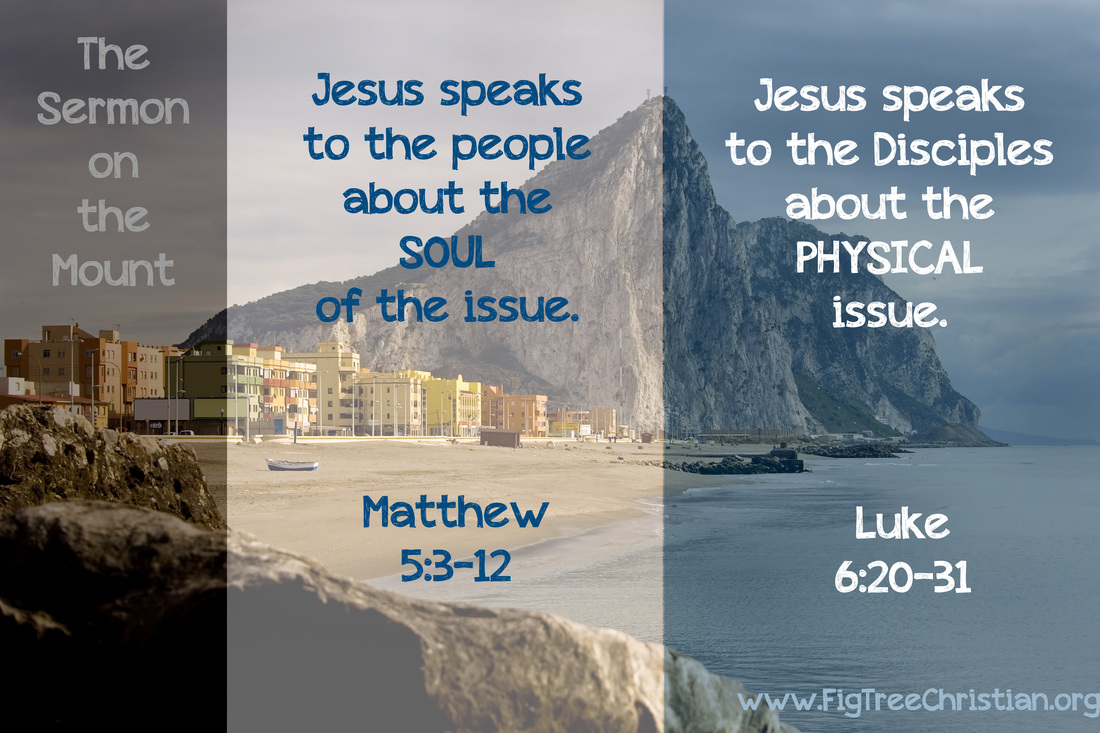
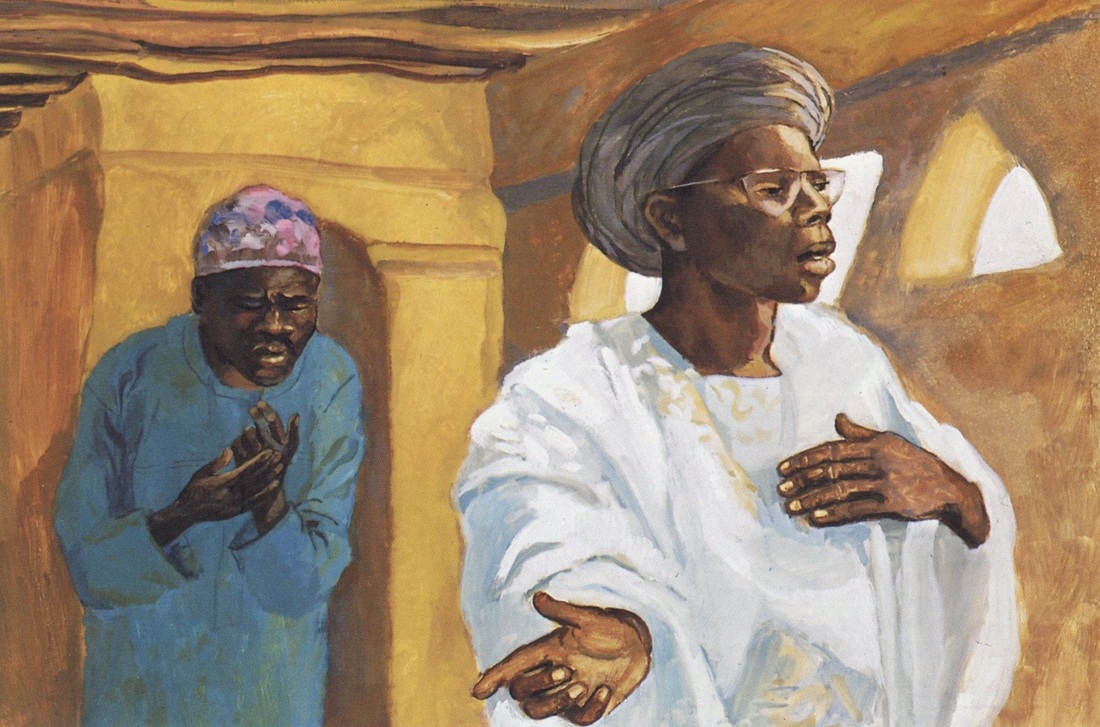
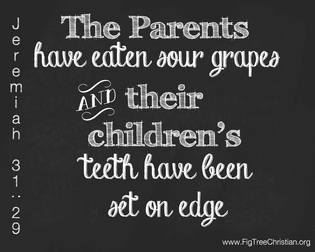
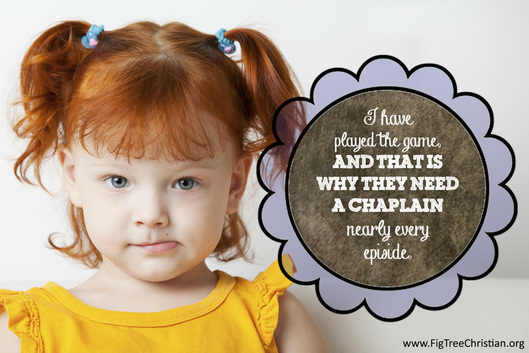

 RSS Feed
RSS Feed